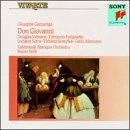| All Artists: Giuseppe Gazzaniga, Bruno Weil, Luciana Serra, Carlo Allemano, Tafelmusik Baroque Orchestra, Kammerchor Stuttgart, Elzbieta Szmytka, Edith Lienbacher, Ferruccio Furlanetto, Anton Scharinger, Helmut Wildhaber Title: Gazzaniga - Don Giovanni / D. Johnson · L. Serra · Szmytka · Lienbacher · Furlanetto · Allemano · Tilli · Scharinger · Wildhaber · Tafelmusik BO · B. Weil Members Wishing: 1 Total Copies: 0 Label: Sony Original Release Date: 1/1/1991 Re-Release Date: 11/1/1991 Genre: Classical Styles: Opera & Classical Vocal, Historical Periods, Classical (c.1770-1830) Number of Discs: 1 SwapaCD Credits: 1 UPCs: 074644669329, 5099704669328 |
Search - Giuseppe Gazzaniga, Bruno Weil, Luciana Serra :: Gazzaniga - Don Giovanni / D. Johnson · L. Serra · Szmytka · Lienbacher · Furlanetto · Allemano · Tilli · Scharinger · Wildhaber · Tafelmusik BO · B. Weil
CD Details |
CD ReviewsAlém de Mozart Leslie Richford | 04/23/2001 (5 out of 5 stars) "Um Don Giovanni completamente diferente. Em um estilo napolitano e muito mais próximo aos "intermezzi" de Pergolesi que ao classicismo Mozartiano.A Tafelmusik regida por Bruno Weil soa maravilhosa em todos os momentos, o regente impõe em toda a ópera, mesmo nos instantes que deveriam ser mais dramáticos,uma ligeireza, uma delicadeza, que a faz um verdadeiro drama giocoso e que coroa as vozes privilegiadas escolhidas para essa gravação única. Luciana Serra e Elsbieta Smytska estão simplesmente encantadoras.O formato sem recitativos apresenta apenas a desvantagem de manter-nos na ignorância quanto a forma como Gazzaniga os trabalhava, mas mesmo assim é uma grande aquisição." Not an Alternative to Mozart, But a Means to Understand Him Leslie Richford | Selsingen, Lower Saxony | 07/04/2008 (4 out of 5 stars) "Giuseppe Gazzaniga (1743 - 1828): Don Giovanni o sia Il Convitato di Pietra. Version without Recitatives. Performed by: Douglas Johnson (Don Giovanni); Luciana Serra (Donna Elvira); Elzbieta Szmytka (Donna Anna and Maturina); Edith Schmid-Lienbacher (Donna Ximena); Ferruccio Furlanetto (Pasquariello); Carlo Allemano (Duca Ottavio); Johann Tilli (Il Commendatore/La Statua); Anton Scharinger (Biagio); Helmut Wildhaber (Lanterna); Members of the Stuttgarter Kammerchor (Stuttgart Chamber Choir); Tafelmusik Baroque Orchestra (Leader: Jean Lamon); dir. Bruno Weil. Recorded at the Doopsgezinde Gemeente Kerk in Harlem, the Netherlands, from 18th to 22nd June 1990. Released in 1991 as Sony Classical Vivarte SK 46 693. 200 page booklet contains full libretto in four languages and extensive artist portraits (with photographs). Total playing time: 68'18".
On the one hand, the very purpose of this recording is, of course, to make a comparison with Mozart's "Don Giovanni" possible: Gazzaniga's version of the opera was probably the most successful before Mozart, and anyone familiar with the Mozart version will discover any number of parallels both in the libretto and, at least occasionally, in the music: Mozart obviously knew the Gazzaniga version, although this had not, at that time, been performed in Vienna. On the other hand, a comparison according to the scheme "better - worse" is ridiculous because it disregards both Mozart's unique genius and Gazzaniga's background as a composer of Italian opera based on the Commedia dell' Arte (he was trained, like so many of his contemporaries, in Naples). So it is better just to enjoy this for its own sake and to learn from it, acknowledging that even a genius like Mozart could take his inspiration from somebody else's ideas - after all, Mozart didn't write his libretti himself but depended on Da Ponte. Bruno Weil's recording, while offering only a shortened version without recitatives, does manage to give a fine taste of how Gazzaniga's work might have sounded in Venice and of why it was so remarkably successful. Apart from the star-studded cast of singers, it is the beautifully-captured efforts of Tafelmusik BO (with Lowell Greer on the horn) which create the impression of newness with their great vivacity and clarity of playing. Among the singers, it is perhaps the basses (Ferruccio Furlanetto as Pasquariello = Leporello; Johann Tilli as Il Commendatore; Anton Scharinger als Biagio) who leave the most indelible impression, although it would perhaps be unfair to distinguish any one singer with special mention in a cast which, personally, I found to be without fault. It is clear that Bruno Weil as conductor managed to convey the magic of the score to all involved, so that a very good recording has ensued, the sound quality of which is, for 1990, excellent (20-bit digital recording by Wolf Erichson and Andreas Neubronner). Of course this is not an alternative to Mozart's opera, Bruno Weil certainly never meant it to be - it complements Mozart and enables the listener better to understand the prevailing operatic ethos of the last decades of the eighteenth century." |


 Track Listings (17) - Disc #1
Track Listings (17) - Disc #1